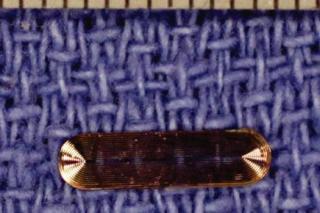Aug 26 2015
A team of researchers, led by Rensselaer Polytechnic Institute (RPI) Professor Eric Ledet, will investigate whether small wireless sensors incorporated into orthopedic implants could be used to detect surgical site infections. The research is supported by a $429,560 grant from the National Institutes of Health.
 Small, simple, wireless, implantable sensors are incorporated into orthopedic implants and placed into the body. The sensors are designed to be sensitive to antigens which are specific to the bacteria which most commonly cause post-surgical infections. Credit: RPI
Small, simple, wireless, implantable sensors are incorporated into orthopedic implants and placed into the body. The sensors are designed to be sensitive to antigens which are specific to the bacteria which most commonly cause post-surgical infections. Credit: RPI
According to the researchers, surgical site infections (SSI) are the most common complication following surgical procedures and account for nearly 20 percent of all health care-associated infections. In the United States, 2 to 5 percent of surgical inpatients will develop an SSI, accounting for approximately 300,000 cases per year. These infections pose greater risks when associated with surgical implants, with complications including additional surgery, implant removal, delayed wound healing, increased use of antibiotics, and death.
The researchers will test an antigen-sensitive hydrogel integrated into a small, simple, inexpensive wireless sensor as a non-invasive tool for early SSI detection in cases of surgical implants. The sensor will be incorporated into orthopedic implants. The SSI sensors have the potential to guide therapy, improve outcomes, and reduce readmissions, revisions, and costs associated with implant-related infections.
Ledet, an associate professor in the Department of Biomedical Engineering, will lead the team that includes Mariah Hahn, a professor in the Rensselaer Department of Biomedical Engineering; Nathaniel C. Cady, Ph.D., an associate professor in the Colleges of Nanoscale Science & Engineering at SUNY Polytechnic Institute; and Dr. Michael T. Archdeacon, the Peter J. Stern Professor and Chairman of the Department of Orthopaedic Surgery at the University of Cincinnati Academic Health Center.
Ledet's research focuses on innovative diagnostic and therapeutic interventions for orthopedic and neurosurgical applications. His work in the area of smart orthopedic implants was recognized as "A Top 10 Medical Breakthrough of 2012" by Consumers Digest Magazine and his smart implant technology was chosen as a finalist for the Lemelson Prize in 2013. Ledet's smart implant work extends to low back pain, fracture fixation, knee osteoarthritis, compartment syndrome, and surgical site infection.